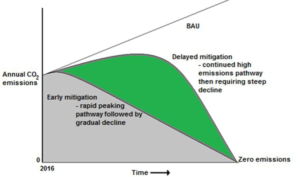A new report commissioned by Westpac suggests billions of dollars could be on the line if there is further delay in moving to a low-carbon economy.
 The report, released today and carried out by EY and Vivid Economics, suggests that New Zealand’s economy could be $30 billion better off if early action is taken to meet the Paris Agreement targets. Modelling two scenarios – an early, smooth transition versus a delayed, abrupt transition – the key difference was the timing of inclusion of agriculture within the NZ Emissions Trading Scheme.
The report, released today and carried out by EY and Vivid Economics, suggests that New Zealand’s economy could be $30 billion better off if early action is taken to meet the Paris Agreement targets. Modelling two scenarios – an early, smooth transition versus a delayed, abrupt transition – the key difference was the timing of inclusion of agriculture within the NZ Emissions Trading Scheme.
While the agricultural industry faced challenges in shifting toward a low-carbon economy, the report concluded the industry would be better off from an early, phased entry into the NZ ETS rather than a more rapid entry later.
The report has been covered by local media, including:
Stuff.co.nz: Early action on climate change would save New Zealand $30b, report finds
NZ Herald: To act now or later: The $30 billion climate change question
Newshub: Early climate action could save NZ billions – study
TVNZ: Billions could be saved with early climate change action, report finds
Radio NZ: NZ to save $30bn by 2050 if it speeds up action on climate change – study
The SMC gathered expert reaction to the report.
Professor Ralph Sims, Director, Centre for Energy Research, Massey University, comments:
“Comparing the two scenarios in Westpac’s NZ report on ‘Climate Change Impacts’ serves to confirm what global scientific and economic analysis has stated for some time – that the sooner we take action to reduce greenhouse gas emissions the greater the benefits will be, and the lower the overall costs in the long term.
“This was a similar key message at the global level from the IPCC (Intergovernmental Panel on Climate Change) in its 5th Assessment Report (2014). It was also covered specifically for New Zealand in the Royal Society’s 2016 report Transition to a low carbon economy for New Zealand which also showed that not only will delaying emission reductions cost more, but result in more total emissions being produced over the same period of time.
 “Compared with business as usual (BAU) shown in the figure, both early and delayed mitigation pathways can reach the same endpoint of net zero carbon dioxide emissions at some stage in the future, but the total CO2 emitted over this period will be less following early mitigation (shown by the grey area) compared with delayed mitigation (the total area under the green curve).
“Compared with business as usual (BAU) shown in the figure, both early and delayed mitigation pathways can reach the same endpoint of net zero carbon dioxide emissions at some stage in the future, but the total CO2 emitted over this period will be less following early mitigation (shown by the grey area) compared with delayed mitigation (the total area under the green curve).
“Westpac NZ has shown leadership on climate change issues in the Australasian banking/finance industry for several years. The commissioning by the bank of this independent report is timely, especially given the Government’s plans to introduce a Zero Carbon Act and to set up an advisory Climate Change Commission. Taking urgent action to reduce our domestic emissions, (including changing the transport sector also currently in the news) will result in many benefits, but, as the Westpac report shows, there will be upfront costs needed to gain the economic benefits in the future. Having to make lifestyle changes and capital investments (such as in transport infrastructure) now, to gain benefits in the long term, is a message that is hard for many New Zealanders to accept. This independent Westpac NZ analysis should lead to a greater understanding of the urgent need for everyone to take action now – a message hard to convey.
“The climate meeting in Paris in 2014 had strong representation by the banking/finance sector. It was very supportive of the Paris Agreement and helped give it international credibility. So it is encouraging that Westpac NZ has continued to develop a vision that will impact on its future investments.”
Professor James Renwick, School of Geography, Environment and Earth Sciences, Victoria University of Wellington, comments:
“The report states that ‘The UN Paris Accord established a consensus view to seek to keep global temperature rises to within two degrees Celsius of the pre-industrial era’. Actually, the Paris Agreement (not ‘Accord’) commits signatory nations to ‘Holding the increase in the global average temperature to well below 2°C above pre-industrial levels and pursuing efforts to limit the temperature increase to 1.5°C above pre-industrial levels’. So the Westpac version is quite a bit softer than the actual Paris Agreement. Also, the kind of emissions scenarios that lie behind these calculations tend to give a ‘good chance’ (66%) of staying below 2C warming, so a 33% chance of over-shooting.
“The finding that it’s better to start earlier and make a smoother transition is good to see, but not surprising. For tourism, I wonder if the report considers the future cost and social acceptability of flying. There’s no indication they have, and these are things that could change quickly.
“The assumption of 2.04% GDP growth through to 2050 is OK I suppose. However, I think there is the risk of ‘GFC-like’ economic slumps world-wide if we were to get major crop failures or significant damage to key coastal infrastructure (e.g. Manhattan). Only speculation, but the assumption of continued steady GDP growth is also speculation…”
